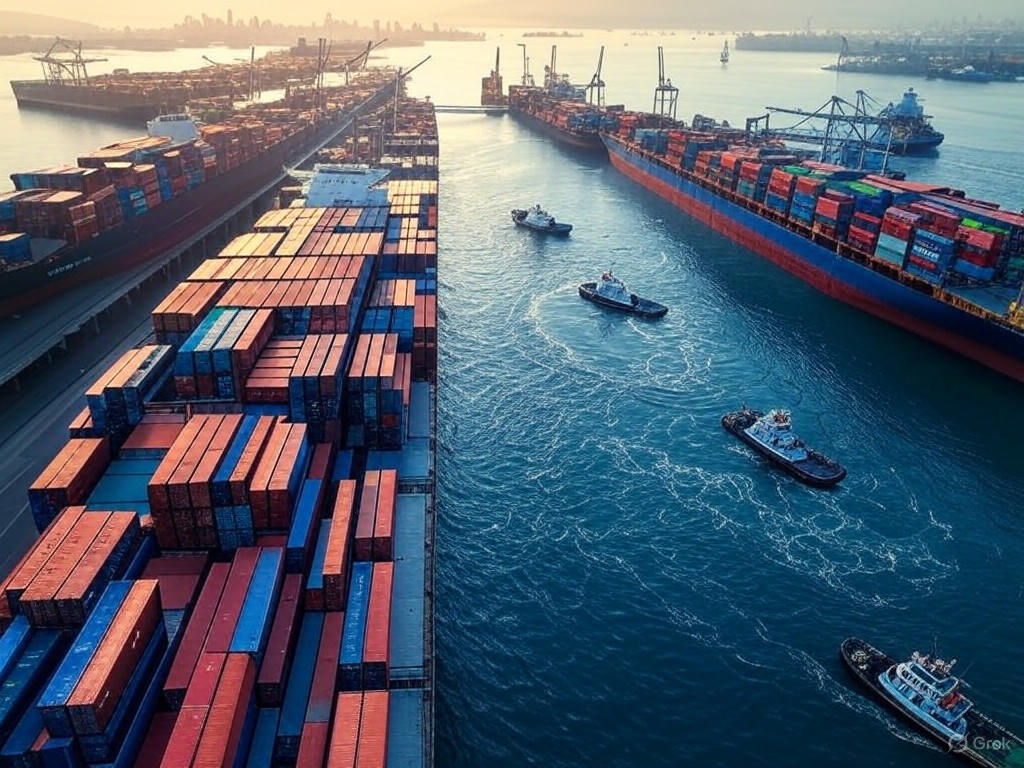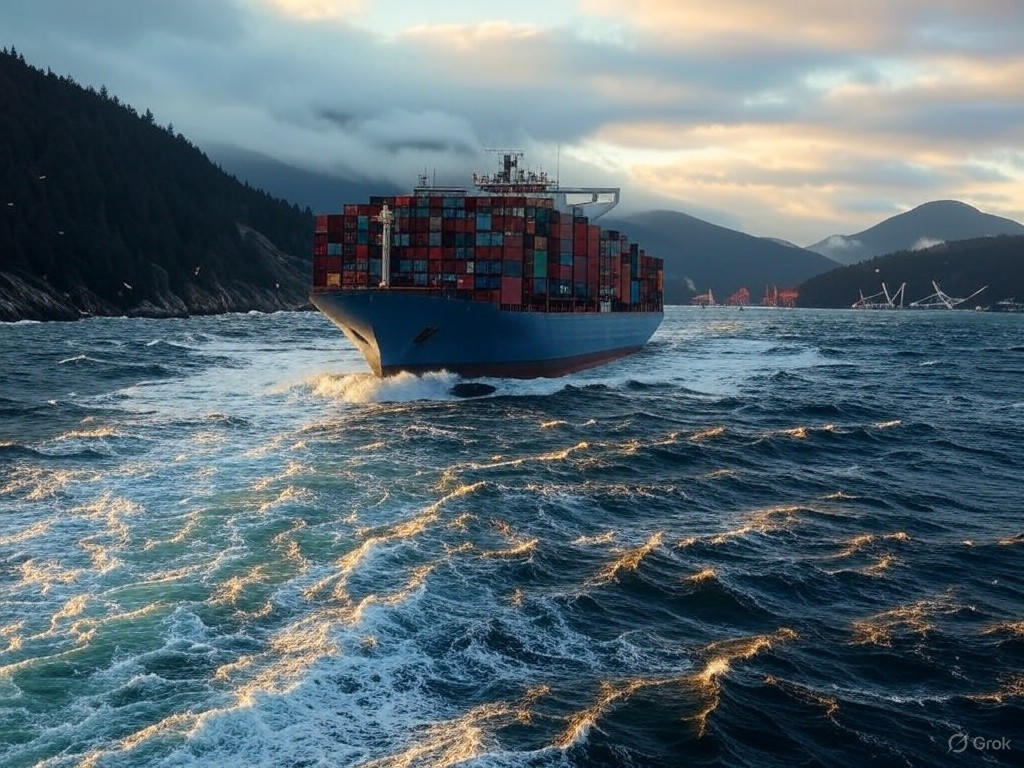BC’s Ports in Global Trade: Strategic Lifelines
In an era defined by escalating trade wars and shifting economic alliances, British Columbia's ports stand as vital arteries in the global trade network. As tensions between major powers like the United States and China continue to reshape supply chains, the ports of Vancouver and Prince Rupert have emerged as indispensable hubs for North American commerce. This editorial argues for a private-sector-led approach to expanding these facilities, emphasizing how market-driven innovation can enhance resilience without overburdening taxpayers or government resources. By fostering free-market principles, British Columbia can solidify its role in the global economy, ensuring long-term stability and prosperity.
The strategic importance of these ports cannot be overstated. Serving as gateways for goods flowing from Asia to the rest of Canada and the U.S., they handle millions of tonnes of cargo annually, from raw materials to finished products. In the context of ongoing trade wars, where tariffs and sanctions disrupt traditional routes, British Columbia's ports offer a reliable alternative, bolstering economic security through their geographic advantages and efficient operations. Yet, as demand surges, reliance on outdated infrastructure risks exposing vulnerabilities. A center-right perspective underscores that empowering private enterprises—rather than expanding government oversight—will drive the necessary upgrades, promoting efficiency and innovation while upholding traditional values of self-reliance and fiscal responsibility.
The Evolving Role of British Columbia's Ports in Global Trade
British Columbia's ports have long been linchpins in the global trade ecosystem, connecting North America to burgeoning markets in Asia. Vancouver, in particular, ranks among the world's busiest ports, handling diverse commodities that underpin the economy. Amid trade wars, such as the U.S.-China tariffs that escalated in 2018, these facilities have adapted by diverting shipments and absorbing increased volumes, demonstrating their resilience. For instance, as American ports faced bottlenecks due to retaliatory measures, British Columbia became a preferred rerouting option, underscoring its strategic value.

This image captures the intricate network of cranes and vessels at Vancouver's port, illustrating the dynamic flow of global trade that sustains millions of jobs across North America.
Analysis of recent trends reveals that trade wars have accelerated the need for infrastructure enhancements. According to experts, the ongoing U.S.-China rivalry has prompted businesses to diversify supply chains, with British Columbia ideally positioned to capitalize Wall Street Journal analysis on trade diversification. Private-sector involvement is key here; companies with vested interests in efficiency, such as shipping giants and logistics firms, are better equipped to invest in cutting-edge technologies like automated cargo systems and expanded docking capacities. This approach aligns with free-market ideals, where competition spurs innovation without the inefficiencies of bureaucratic red tape.
Evidence of Resilience Through Private-Sector Expansion
The evidence for private-sector-led growth is compelling, drawn from both historical successes and current economic data. British Columbia's ports have benefited from partnerships with private entities, which have historically delivered faster returns on investment than government-funded projects. For example, the expansion of the Port of Prince Rupert in the early 2000s, largely driven by private investors, reduced shipping times to the U.S. Midwest by days, enhancing competitiveness Port Strategy report on infrastructure investments. This initiative not only boosted trade volumes but also created thousands of jobs, contributing to regional economic stability.
In the face of trade wars, such expansions have proven their worth. Data from the British Columbia government indicates that port traffic increased by 15% between 2019 and 2023, partly due to private investments in digital tracking systems that minimized delays during tariff-induced disruptions Canadian Trade and Investment Network overview. Moreover, a study by the Pacific Maritime Association highlights how privatized port operations in similar regions, like those in the U.S. West Coast, have led to a 20% improvement in turnaround times, directly correlating with lower costs for businesses Pacific Maritime Association efficiency report. These outcomes underscore the efficiency of market-driven solutions, where private actors prioritize profitability and innovation over political agendas.

This photo depicts massive container ships traversing the Strait of Georgia, emphasizing the critical role of BC's ports in maintaining uninterrupted global trade flows amid geopolitical tensions.
Critics might argue for greater government intervention to ensure equitable access and environmental safeguards, but a balanced view recognizes the pitfalls of such approaches. Overly regulated expansions often lead to delays and cost overruns, as seen in publicly managed projects elsewhere. Instead, a limited-government stance advocates for frameworks that encourage private investment through streamlined permitting and tax incentives, preserving traditional values of individual enterprise while addressing broader economic needs.
Advocating for a Path Forward: Free-Market Solutions for Long-Term Resilience
As global trade wars persist, British Columbia must prioritize resilience through strategic, private-sector-led expansions. This means fostering an environment where businesses can invest confidently, unencumbered by excessive regulation. Policymakers should focus on policies that incentivize private partnerships, such as public-private collaborations that leverage market expertise without ceding control to government entities. Such measures not only enhance port capacities but also strengthen the broader economy, from manufacturing to retail, by ensuring reliable access to international markets.
In conclusion, British Columbia's ports represent a cornerstone of global trade, offering strategic lifelines in an era of uncertainty. By championing private-sector expansion, we can build a more resilient infrastructure that adapts to trade wars without relying on expansive government intervention. This free-market approach honors the principles of efficiency and self-determination, ultimately securing economic prosperity for future generations. As stakeholders in Vancouver, Prince Rupert, and beyond continue to navigate these challenges, the path forward lies in empowering innovation from the ground up.

